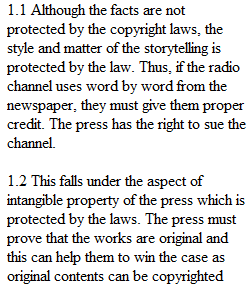


Q Hi all, Please post your responses to the chapter 14 problem questions here. Problem Questions 1. The Oakland Press is an afternoon daily newspaper in a mid-sized town in Tennessee. The only other news outlet in the city is radio station WTEN. Each morning, a member of the WTEN staff reads local news stories published in the previous day’s newspaper. No credit is given to the newspaper, and all or most of the stories are read word for word. The Press sues, claiming that the radio station is stealing its work for commercial purposes. WTEN counters that because the newspaper is not copyrighted, reading the news over the air is fair game. 1. Would the Press win a copyright action against WTEN? Why or why not? 1. Is there another cause of action that might provide relief for the newspaper? What would the Press have to prove to win its case? 2. Sandra Hughes is a reporter for the Los Angeles Times. She was assigned to cover the murder trial of Robert Blake. The film and television star was charged with killing his wife, but surprisingly was found not guilty by a jury. Hughes gathered a great deal more information while covering the case than was ever published in the Times. After the trial ended she wrote a non-fiction book about the case, The Blake Mystery Solved. In the book she contends that there was more evidence against Blake than the prosecution presented at the trial, but that the district attorney chose not to include this evidence because it would have compromised the identity of an important police informant. Prosecutors believed--mistakenly—that they had sufficient evidence to win the case without this additional evidence. The Warner Bros. film studio contacted Hughes about using her book as the basis for a film about the case, starring Ashton Kutcher in the Blake role. Hughes like the idea, but didn't like the offer of $500,000 for the rights to the book. She wanted an even million. Warner Bros. went ahead and made the film anyway, using the book as the basis for important parts of the script--including the material about the additional evidence that was never used. They used a lot of her ideas about the case, but the script was totally different from the prose she wrote for the book. They credited Hughes' book at the end of the film but paid her no money. Hughes sued for copyright infringement, claiming the studio stole her work. She said she worked for more than a year on the book, and deserves fair compensation for her efforts. Warner Bros. makes two arguments in its defense. First, it argues that the film was a fair use of the material in the book. Second, they argue that the material the studio used for the film is not protected by copyright. A. Outline below the four criteria used by the courts to determine whether a use is a fair use or not. B. Does the studio need to raise the fair use defense? Why or why not. C. Who will win the case and why? 3. Outdoor Fun publishing company released a book entitled “The Campers Handy Guide to Fun in the Forest.” The book had sixteen chapters on topics as various as how to purify water from a stream, how to hang food stuffs from a tree to guard against hungry bears, and how to make a good and safe campfire. Six months after the book was published by a company called Outdoor Life brought a copyright suit against Outdoor Fun, arguing that its chapter on campfires used copyrighted material from its book, “The Safe Campfire in the Forest.” The 16-page chapter in Outdoor Fun’s volume included material on the proper wood to use, how to get the fire started, how to keep it burning, and how to safely extinguish it. What are the three elements that must be proved by the plaintiff in a copyright infringement case? Will the plaintiff win in this case?
View Related Questions